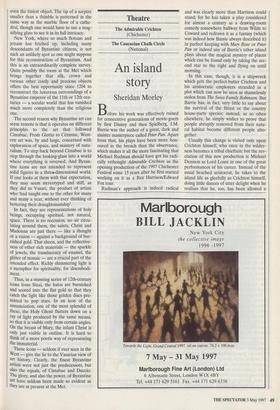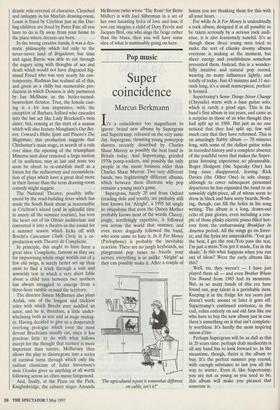Theatre
The Admirable Crichton (Chichester) The Caucasian Chalk Circle (National)
An island story
Sheridan Morley
Before his work was effectively ruined for consecutive generations of movie-goers by first Disney and then Spielberg, J.M. Barrie was the author of a great, dark and sinister masterpiece called Peter Pan. Apart from that, his plays have been more hon- oured in the breach than the observance, which makes it all the more fascinating that Michael Rudman should have got his radi- cally rethought Admirable Crichton as the opening production of the 1997 Chichester Festival some 15 years after he first started working on it as a Rex Harrison/Edward Fox tour.
Rudman's approach is indeed radical and was clearly more than Harrison could stand; for he has taken a play considered for almost a century as a drawing-room comedy somewhere halfway from Wilde to Coward and redrawn it as a fantasy (which was indeed how Barrie always described it) in perfect keeping with Mary Rose or Peter Pan or indeed any of Barrie's other island plays about the magical mystery of places which can be found only by taking the sec- ond star to the right and flying on until morning.
In this case, though, it is a shipwreck which gets the perfect-butler Crichton and his aristocratic employers stranded in a plot which can now be seen as shamelessly stolen from The Swiss Family Robinson. But Barrie has, in fact, very little to say about the survival of the fittest or the country house-party species; instead, as so often elsewhere, he simply wishes to prove that people abruptly removed from their natu- ral habitat become different people alto- gether.
Usually this change is visited only upon Crichton himself, who once in the wilder- ness becomes a tribal chieftain; but the rev- elation of this new production is Michael Denison as Lord Loam in one of the great performances of his career. Instead of the usual beached aristocrat, he takes to the island life as gleefully as Crichton himself, doing little dances of utter delight when he realises that he, too, has been allowed a drastic role-reversal of character. Clenched and unhappy in his Mayfair drawing-room, Loam is freed by Crichton just as the Dar- ling children are freed by Peter Pan; all you have to do is fly away from your home to the place where dreams are born.
In the wrong creative hands, it was a dra- matic philosophy which led only to the never-never land of Brigadoon; but time and again Barrie was able to cut through the sugary icing with thoughts of sex and death which would not have disgraced Sig- mund Freud who was very nearly his con- temporary. Rudman has realised all of this, and given us a chilly but memorable pro- duction in which Denison is ably partnered by Ian McShane as the butler-turned- benevolent dictator. True, the female cast- ing is a lot less impressive, with the exception of Barbara Jefford who cascades into the last act like Lady Bracknell's twin sister; but, coining at the start of a season which will also feature Maugham's Our Bet- ters, Coward's Blithe Spirit and Pinero's The Magistrate, this production suggests that Chichester's main stage, in search of a role ever since the opening of the triumphant Minerva next door removed a large section of its audience, may at last and none too soon be about to re-establish itself as a forum for the rediscovery and reconsidera- tion of plays which have a great deal more in their favour than the term drawing-room comedy might suggest.
The National Theatre, possibly influ- enced by the road-building fever which has made the South Bank about as inaccessible as Crichton's island (and in splendid time to annoy all the summer tourists), has torn the heart out of its Olivier auditorium and converted it into a theatre-in-the-round for a summer season which kicks off with Brecht's Caucasian Chalk Circle in a co- production with Theatre de Complicite.
In principle, this ought to have been a great idea: Complicite, famous as they are for improvising whole stage worlds out of a few old twigs, is surely better set up than most to find a track through a vast and unwieldy text in which a very short fable about a child torn between two mothers has always struggled to emerge from a three-hour ramble around the territory.
The director Simon McBurney also plays Azdak, one of the longest and trickiest roles with which Brecht ever saddled an actor, and he is, therefore, a little under- whelming both as star and as stage manag- er. Having decided to give us a desperately overlong prologue which even the most devout Brechtians usually cut, since it has precious little to do with what follows except for the thought that nurture is more important than nature, McBurney then allows the play to disintegrate into a series of carnival turns through which only the radiant classicism of Juliet Stevenson's stoic Grusha gives us anything at all worth following across an often messy fairground.
And, finally, at the Pizza on the Park, Knightsbridge, the cabaret singer Amanda McBroom (who wrote 'The Rose' for Bette Midler) is with Joel Silberman in a set of her own haunting lyrics of love and loss; if you can imagine a child of Dory Previn and Jacques Brel, one who sings the beige rather than the blues, then you will have some idea of what is unmissably going on here.



































































 Previous page
Previous page